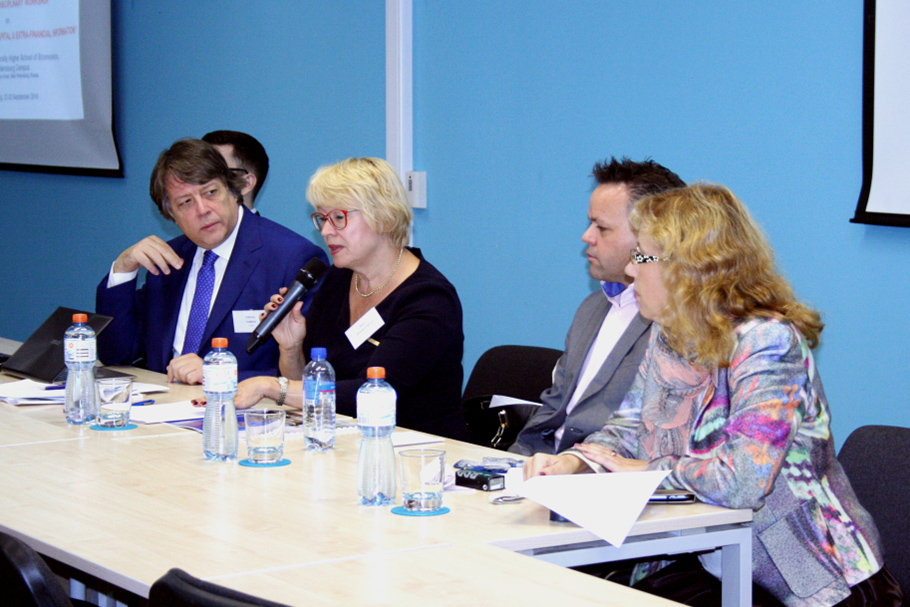- A
- A
- A
- ABC
- ABC
- ABC
- А
- А
- А
- А
- А
- HSE University
- Faculties
- Faculty of Economic Sciences
- School of Finance
- News
- Research & Expertise
- Interest in Intellectual Capital and Intangibles Is Present in All Countries
-
The School
-
RESEARCH ACTIVITIES
- Laboratories
- Series “Advanced studies in emerging market’s finance” at Springer Nature o Networking with international academic associations
- Networking with international academic associations
- Research seminars
- International PhD workshop
- The International Seminar «ESG Transformation»
-
RESEARCH WORKING GROUPS
- Research Working Group "Innovations in the banking sector, its financial stability and prudential regulation"
- BUSINESS EDUCATION
- Networking with business associations
- Networking with professional associations
- Center for Research on Non-Financial Reporting
-
DATABASES
119049 Moscow, Russia
11 Pokrovskiy boulevard, room S629
Phone:
+7 (495) 772-95-90*27447, *27947, *27190
+7 (495) 916-88-08 (Master’s Programme Corporate Finance)
- Email: df@hse.ru
Head of Corporate Finance Research Center, Dr., tenured professor

+7495-772-95-90 (add. 27447)

+7495-772-95-90 (add. 27947)
The HSE School of Finance is the leading Russian competence center in the field of corporate finance, business valuation, banking, stock market, risk management and insurance, accounting and audit.
HSE is the first Russian university in the global ranking "QS - World University Rankings by subject", 2022 in the subject area of Accounting and Finance. Moreover, the university is the 1-st in the rating "THE World University Rankings by subject" in the subject area of Business & Management Studies, 2022
Cherkasova V. A., Nenuzhenko I.
Journal of Economic Integration. 2022. Vol. 37. No. 1. P. 54-92.
Electronic Journal of Applied Statistical Analysis. 2022. Vol. 15. No. 1. P. 187-210.
Kolade S. A., Semenova M.
Financial Economics. FE. Высшая школа экономики, 2022. No. WP BRP 87/FE/2022.
Управление финансовыми рисками. 2022. Т. 70. № 2. С. 108-120.
In bk.: The 8th International Conference on Information Technology and Quantitative Management (ITQM 2020 & 2021): Developing Global Digital Economy after COVID-19. Vol. 199: The 8th International Conference on Information Technology and Quantitative Management (ITQM 2020 & 2021): Developing Global Digital Economy after COVID-19. Manchester: Elsevier, 2022. P. 798-805.
Korablev D., Poduhovich D.
Journal of Corporate Finance Research. 2022. Vol. 16. No. 1. P. 136-145.
Olkhovik V., Lyutova O. I., Juchnevicius E.
Научно-исследовательский финансовый институт. Финансовый журнал. 2022. Vol. 14. No. 2. P. 73-90.
Churyk N. T., Anna Vysotskaya, Kolk B. v.
Journal of Accounting Education. 2022. Vol. 58.
Абдрахманова Г. И., Васильковский С. А., Вишневский К. О. и др.
М.: Издательский дом ГУ-ВШЭ, 2022.
Абдрахманова Г. И., Васильковский С. А., Вишневский К. О. и др.
М.: Национальный исследовательский университет "Высшая школа экономики", 2022.
Гришунин С. В., Сулоева С. Б., Пищалкина И. И.
Организатор производства. 2022. Т. 30. № 1. С. 60-72.
Гришунин С. В., Сулоева С. Б., Пищалкина И. И.
Экономический анализ: теория и практика. 2022. Т. 21. № 3. С. 478-496.
S. Grishunin, E. Naumova, N. Lukshina et al.
Russian Management Journal. 2021. Vol. 19. No. 4. P. 475-493.
Journal of Corporate Finance Research. 2022. Vol. 16. No. 1. P. 99-112.
Grishunin S., Bukreeva Alesya, Alyona A.
In bk.: The 8th International Conference on Information Technology and Quantitative Management (ITQM 2020 & 2021): Developing Global Digital Economy after COVID-19. Vol. 199: The 8th International Conference on Information Technology and Quantitative Management (ITQM 2020 & 2021): Developing Global Digital Economy after COVID-19. Manchester: Elsevier, 2022. P. 190-197.
 International Conference “Future Directions in Accounting and Finance Education”, 27-28 May 2019, Moscow, Russia
International Conference “Future Directions in Accounting and Finance Education”, 27-28 May 2019, Moscow, Russia
Edited by: А. Б. Высотская, B. v. Kolk.
Vol. 58. Elsevier, 2022.
Karamysheva M., Seregina E.
Journal of International Money and Finance. 2022. Vol. 127.
In press
Journal of Economic Dynamics and Control. 2022. Vol. 137.
Karamysheva M., Skrobotov A.
Journal of Economic Dynamics and Control. 2022. Vol. 138.
Известия Санкт-Петербургского государственного экономического университета. 2022. № 4. С. 144-155.
Тихомиров Д. В., Цехомский Н. В.
Экономика и управление. 2022. Т. 28. № 1. С. 16-24.
Селезнёва З. В., Евдокимова М. С.
Финансы: теория и практика. 2022. Т. 26. № 3. С. 64-84.
Evdokimova M., Stepanova A. N.
In bk.: 38th EBES Conference - Program and Abstract Book. Istanbul: EBES, 2022. P. 39.
Assanskiy A., Shaposhnikov D., Tylkin I. et al.
Journal of Behavioral and Experimental Economics. 2022. Vol. 98.
Teplova T., Mikova E., Munir Q. et al.
Economic Change and Restructuring. 2023. Vol. 56. No. 1. P. 515-535.
Повх К. С., Кокорева М. С., Степанова А. Н.
Экономический журнал Высшей школы экономики. 2022. Т. 26. № 1. С. 9-36.
Anton Markov, Zinaida Seleznyova, Victor Lapshin.
Journal of Finance and Data Science. 2022. Vol. 8. P. 180-201.

Interest in Intellectual Capital and Intangibles Is Present in All Countries

Stefano Zambon, Professor of the University of Ferrara, Irina Ivashkovskaya, Head of the Department of Finance, Christopher Gerry, Professor at the St. Petersburg School of Social Sciences and Humanities and Elena Rogova, Dean of HSE St Petersburg School of Economics and Management
The 12th Annual International Workshop ‘Intangibles, Intellectual Capital and Extra-Financial Information’ was held at HSE St Petersburg last week. This is an established event that many academics and practitioners in the area of intellectual capital and intangibles know about due to its high credibility. Most of the relevant people in this field have participated in the workshop throughout the years.
Co-organizer of the event, Stefano Zambon, Professor of the University of Ferrara, Chairman of the World Intellectual Capital/Assets Initiative Network Europe (WICI Europe) underlines, that it is very important that this year’s event took place in Russia. ‘One of the important elements for the development of the Russian economy in the next few years is linked to knowledge. Creativity, innovation, and all these aspects have in common the predominant presence of intangible resources. Innovation is based on ideas - new concepts. In order to have an innovation, you need to have leadership, organizational procedures, skills, competencies, so all these aspects are intangible. All these aspects together give rise to the IC of an organization.’
Professor Zambon notes the important contribution of HSE Tenured Professor Irina Ivashkovskaya in setting up the context of this workshop and Professor Elena Rogova (Dean of HSE St Petersburg School of Economics and Management) in creating the preconditions for this event. ‘We are all interested in value creation and to understand the roots of value creation, so I’m sure there will be more possibility to carry out research together very soon,’ says Prof Zambon.
The title of this workshop has ‘interdisciplinary’ in the name. That is because this field is interdisciplinary. There are various strands from different perspectives from which you can look at IC. One important trend that emerged very strongly this year is the role of IC in public sector entities. It is an important trend that this year exploded. One-third of the papers presented at the workshop come from this perspective - the role of IC in public sector entities. Another important trend is linked to the rise of so-called integrated reported and thinking. It’s a new way to manage companies and to report on companies, looking at them in a holistic way. When you look at the management of organizations in a holistic way, you have the problem of how to understand the role of intangible resources. If you look at organizations in an integrated way, you want to understand why an organization produces value. What are the value drivers for this organization? And you will see that in 90 percent of the cases, the answer is always intangible resources.
Professor Zambon states that the interest in IC and intangibles is present in all countries. There might be different accents in the perspective. For instance, in Austria, the big interest in IC is linked to the fact that universities there are bound to prepare and publish an IC statement - each university, each year. So there is interest because they must do this by law. In some other countries, for example Australia and Italy, there is an interest in integrated reporting. In Spain, there is an interest in intangibles in the public sector. There’s a quite horizontal interest in intangibles. In Germany, there is a particular reporting practice called report on knowledge because many small and medium enterprises publish this. There are some variations, but, on the whole, it is a quite generalized interest with some distinct interests in some countries.
Elena Rogova
- About
- About
- Key Figures & Facts
- Faculties & Departments
- International Partnerships
- Faculty & Staff
- HSE Buildings
- Public Enquiries
- Studies
- Admissions
- Programme Catalogue
- Undergraduate
- Graduate
- Exchange Programmes
- Summer University
- Summer Schools
- Semester in Moscow
- Business Internship
-
https://elearning.hse.ru/en/mooc/
Massive Open Online Courses
-
https://www.hse.ru/en/visual/
HSE Site for the Visually Impaired
-
http://5top100.com/
Russian Academic Excellence Project 5-100
- © HSE University 1993–2024 Contacts Copyright Privacy Policy Site Map
- Edit


